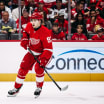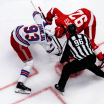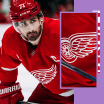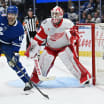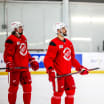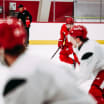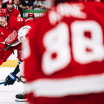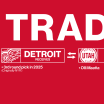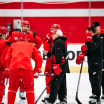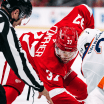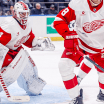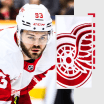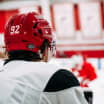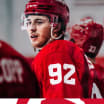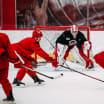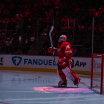OSTRAVA, CZECH REPUBLIC -- After a disappointing sixth-place finish for Team Canada at last year's world junior championship, Jared McIsaac was grateful to have another year of eligibility and the potential to earn a gold medal at the 2020 IIHF World Junior Championship in Ostrava, Czech Republic. But, a few weeks later, he dislocated his right shoulder -- an injury that would plague him throughout the rest of the season and put his ability to participate in the world junior championship in jeopardy.
Wings prospect McIsaac seeks gold at World Junior Championship
Young defenseman just returned to action after recovering from offseason shoulder surgery
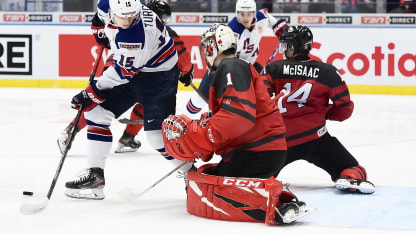
© Andrea Cardin/HHOF-IIHF Images
By
Julie Robenhymer @JulieRobenhymer / Special to DetroitRedWings.com
"I hurt my shoulder last year at rookie camp and then I was fine until January," said the 6-foot-1, 192-pound defenseman who was drafted by the Detroit Red Wings in the second round of the 2018 NHL Draft and signed an entry-level contract a few months later. "That's when it started to flare up. It'd be great for a week and then slip out again and then be great and it would go like that off and on. It was kind of a battle for the rest of the year. I knew I needed surgery, but I wanted to wait until the end of the season to get it done and I just tried to play through it as much as possible, especially with our long Memorial Cup run last year. I just wanted to help the team as much as I could.
"Towards the end, I was prepared for it to slip out. It's almost like I expected it to," McIsaac continued. "Whenever it happened, it would hurt quite brutally for 10-15 minutes and then just be a dull ache for the rest of the game. I'm pleased with how I played through it and how well I did. My trainer in Halifax -- Robin Hunter -- she did a great job with managing it as much as possible even though it was pretty tough some nights."
After the Halifax Mooseheads lost in the Memorial Cup final, McIsaac wanted to have surgery as soon as possible. He knew the recovery time was five to six months and, if all went well, he could be back playing games by December.
But with Team Canada's preliminary roster announced December 2nd and their selection camp starting December 9th, he knew he'd really have to push himself if he wanted another shot at world junior gold.
Still getting up to speed after shoulder injury, returning blueliner Jared McIssac eager for #WorldJuniors redemption: https://t.co/C55ArULLol #TSNHockey pic.twitter.com/o8LK5DQoJC
— TSN Hockey (@TSNHockey) December 10, 2019
"I was in Detroit for surgery on June 6th and was there for a week. I flew home and did the first two months of my rehab there then went back to Detroit for rookie camp and stayed there for two and a half, almost three months," he explained. "I was lacking a bit of range and strength in September so we really pushed that for a good three months. I only got back to Halifax two weeks prior to leaving for this camp. I was definitely ready and got a couple games under my belt before camp and felt really good. Like I said, they did a really good job of pushing me real hard in Detroit to make sure I was ready as far as the shoulder goes and conditioning-wise. I'm really pleased with where I'm at now."
Throughout the entire process of trying to strengthen the shoulder and manage the discomfort to finish the season and then the recovery and rehab after surgery, McIsaac discovered a lot about his mental fortitude.
"You just learn a lot about yourself," the 19-year-old from Nova Scotia said. "Going through last year and playing through that and the mind games of not knowing if it would happen again or when and still playing my hardest. It was tough, but I think it made me a better hockey player. Some nights, I wasn't able to play as physically as I usually would or would want to, but I still found ways to contribute and help my team win."
McIsaac didn't return to the lineup in Halifax until November 30 and only played three games before joining Team Canada at selection camp.
Jared McIsaac is back, contributed right away with an assist and he’s focused on the World Juniors. @DetroitRedWings pic.twitter.com/VDIzjAipjS
— Halifax Mooseheads (@HFXMooseheads) December 1, 2019
"I realize I've only played a handful of games up to this point and the other guys have been playing all year, but I feel real good with where my game is at and am prepared to play whatever role is thrown at me and I hope to contribute at both ends of the rink. It's up to the coaches, but I think I'll have a shutdown role playing top-four minutes."
Team Canada head coach Dale Hunter said he gives McIsaac a lot of credit for battling back and getting himself prepared for the tournament and earning a spot on this team.
"We're real happy he's available for us because he's just a solid D. You trust him in every situation," he said. "He gets pucks through from the point and that's huge for us 5-on-5 and if we need him on the power play, I know he can play up top for us too, but we're going to rely on him to defend well and protect the puck well more than anything."
A winning start to the #WorldJuniors for Lavoie & McIsaac 🇨🇦. #GoMooseGo 📸Andrea Leigh Cardin / HHOF-IIHF Images pic.twitter.com/JGgGDgFUZF
— Halifax Mooseheads (@HFXMooseheads) December 27, 2019
It's a mark of pride for McIsaac, who has worked hard to transform his game over the past three seasons, to be more of a versatile player because as much as he used to jump into the play, his role as an actual defenseman was a bit blurry.
"Going into major junior, it was more about your play with the puck and not so much about going in and getting the puck," he said with a laugh. "I had Andre Tourigny as my coach the first year in Halifax and he really pulled the reins in on me and helped me learn how to play more of a two-way game. I owe a lot to him."
Tourigny is an assistant coach for Team Canada this year and has a front row seat to see McIsaac's progress these past few years.
"When I coached him that first year, he was thinking all the time about offense and more standing around defensively trying to cut the play instead of grinding and taking his man and playing the one-on-one, physical game," Tourigny said. "Now, he's a completely different player. One, he's more mature physically. Two, he can read the play better. Three, he has a lot of poise and that helps a lot on the breakout. He can make the nice short play. He can make the long play. He can find the open guy and he can put pucks on net offensively, too. And, most importantly, his mindset has changed. He takes care of his own end first, defends well and is very reliable there before thinking about offense."
In his first game of this year's tournament, McIsaac logged 18:46 and was relied upon heavily in the second and third periods as Canada erased a two-goal deficit and then defended the lead to beat USA 6-4 in the preliminary round.
He's worn the red and white maple leaf three times before -- twice at the U18 world championship and last year's world junior tournament -- but has no medals to show for it.
He is acutely aware that this might be his last opportunity to not only represent his country, but win a gold medal as well.
"Of course I want to play well, but without a gold medal around my neck at the end of the tournament, I didn't accomplish anything," McIsaac said.
"I might learn a lot and that's great for my development and becoming a pro player, but I came to this tournament to help this team win a gold medal. That's the accomplishment."

